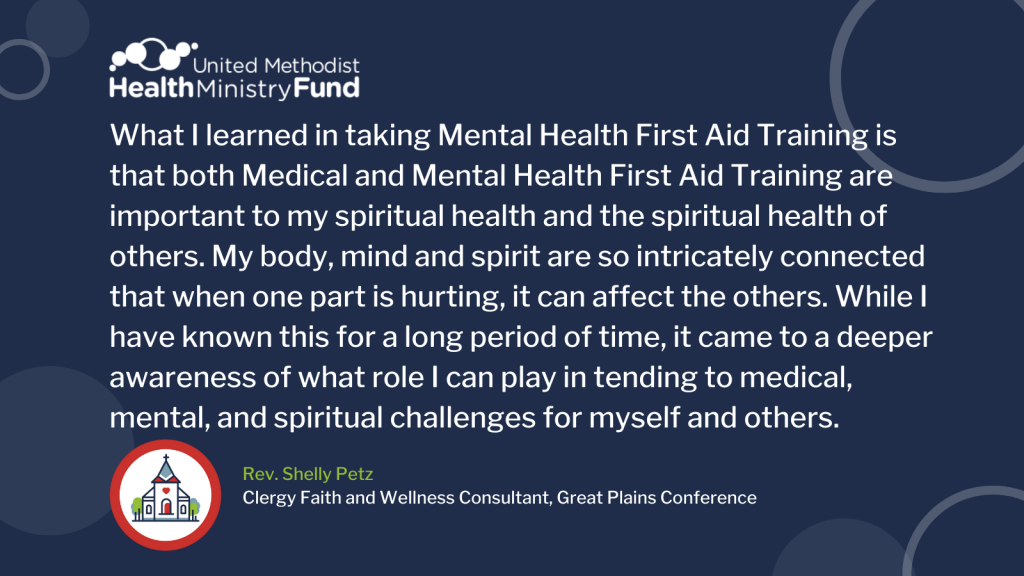Register below and join us for Adult or Youth Mental Health First Aid (MHFA) training. These virtual sessions are offered at no cost to individuals and congregations in the Great Plains United Methodist Conference, and to any interested Kansans.

- 9:00 – 3:30, via Zoom (with breaks)
- Mental Health First Aid for Adults teaches people how to recognize signs of mental health or substance use challenges in adults ages 18 and older, how to offer and provide initial help, and how to guide a person toward appropriate care if necessary.
- Expanded content on trauma, substance use and self-care.
- View Adult MHFA flyer

- 9:00 – 2:30, via Zoom (with breaks)
- Youth Mental Health First Aid teaches parents, family members, caregivers, teachers, school staff, peers, neighbors, health and human services workers, and others how to help adolescents (age 12-18) experiencing a mental health or substance abuse challenge or in crisis.
- Expanded content on trauma, substance use, self-care and the impact of social media and bullying
- View Youth MHFA flyer
Mental Health First Aid training is a proven and effective resource that teaches lay people how to identify, understand and respond to signs of mental illnesses and substance use disorders in their community. In this one-day, online training, participants will learn risk factors and warning signs for mental health and substance use concerns, strategies for how to help someone in both crisis and non-crisis situations, and where to turn for help. The training helps anyone who wants to learn how to provide initial help to someone who may be experiencing symptoms of a mental illness or crisis, and provides tools to help friends, family members, colleagues, and others in the community.
Additionally, MHFA teaches about recovery and resiliency – the belief that individuals experiencing these challenges can and do get better, and can use their strengths to stay well. Trainees also learn how to apply the Mental Health First Aid action plan in a variety of situations, then practice through role play, scenarios, and activities — making it easier to apply these skills in a real-life situation.
Why Mental Health First Aid?
“Most of us would know how to help if we saw someone having a heart attack—we’d start CPR, or at least call 9-1-1. But too few of us would know how to respond if we saw someone having a panic attack or if we were concerned that a friend or co-worker might be showing signs of alcoholism.
Mental Health First Aid takes the fear and hesitation out of starting conversations about mental health and substance use problems by improving understanding and providing an action plan that teaches people to safely and responsibly identify and address a potential mental illness or substance use disorder.
When more people are equipped with the tools they need to start a dialogue, more people can get the help they need. Mental Health First Aid can even save lives.”
www.mentalhealthfirstaid.org
Nearly one in five Americans has a mental illness or substance use disorder, yet many are reluctant to seek help or simply don’t know where to turn for care. Recognizing mental health and substance use challenges can be difficult, which is why it’s so important for everyone to understand the warning signs and risk factors. Even when friends and family of someone who may be developing a mental illness recognize that something is amiss, they may not know how to intervene or direct the person to proper treatment. All too often, those in need of mental health services do not get them until it is too late.
- 64.1% of youth with major depression do not receive any mental health treatment ~ Mental Health America
- 5.13% of youth report having a substance use or alcohol problem ~ Mental Health America
- 1 in 5 teens and young adults lives with a mental health condition ~ National Alliance for Mental Illness
- On average 123 people die by suicide each day ~ American Foundation for Suicide Prevention
- From 1999-2016, 630,000 people died from drug overdose ~Centers for Disease Control and Prevention
Mental Health First Aid training details
The Opportunity:
Free, online Mental Health First Aid training focused on adults or youth 12-18
Eligibility:
-Any individuals in the Great Plains Conference
-Any interested Kansans
Deadlines:
Rolling deadline. Register at least 2 weeks prior to the training date.
Questions:
Dashinika Poindexter, Dashinika@healthfund.org
FAQ:
How soon do I need to register for training? At least two weeks before the training date. Spaces are limited, and sessions may be cancelled for low registration.
My church is not in Healthy Congregations. Can I participate? Yes, these trainings are open to any interested individuals in the Great Plains Conference, as well as any interested Kansans.
What is the time commitment? This training consists of ~2 hours of self-paced pre-course work and a 6.5 hour (adult) or 5.5 hour (youth) live virtual training (with breaks).
How do I participate?
1. Register online here.
2. Complete pre-work (emailed by trainer) at least 48 hours before your training.
3. Join your scheduled online training session.
Will you provide a dedicated training for my organization? No, registrations are only available on an individual basis.

What You’ll Learn:
Before you can know how to help, you need to know when to help. This “mental health literacy” is a basic understanding of different mental illnesses and substance use disorders, how they can affect a person’s daily life, and what promotes wellness in affected individuals. Training topics include:
- Common signs and symptoms of mental illness (including anxiety, depression, ADHD, psychosis)
- Common signs and symptoms of substance use
- How to interact with a person in crisis
- How to connect the person with help
- Content on trauma, substance abuse and self-care, and the impact of social media and bullying
Mental Health First Aid teaches how to identify, understand and respond to signs of mental illnesses and substance use disorders. The course introduces participants to risk factors and warning signs of mental health concerns, builds understanding of their impact and provides an overview of common treatments. Through role-playing and simulations, it demonstrates how to assess a mental health crisis; select interventions; provide initial help; and connect people to professional, peer and social supports as well as self-help resources.
Trainees learn a five-step action plan (ALGEE) encompassing the skills, resources, and knowledge to help an individual in crisis connect with appropriate professionals, and/or develop self care and coping strategies.
- Assess for risk of suicide or harm.
- Listen nonjudgmentally.
- Give reassurance and information.
- Encourage appropriate professional help.
- Encourage self-help and other support strategies.
Mental Health First Aid encourages early detection and intervention by teaching participants about the signs and symptoms of specific illnesses like anxiety, depression, schizophrenia, bipolar disorder, eating disorders and substance use disorders. The program offers concrete tools and answers key questions like “What can I do?” and “Where can someone find help?” Participants are introduced to local mental health resources, national organizations, support groups and online tools for mental health and substance use disorder treatment and support.
Mental Health First Aid USA is operated by the National Council for Mental Wellbeing. Training is provided by certified Mental Health First Aid USA instructors who have completed a 5-day training and meet certification requirements.


